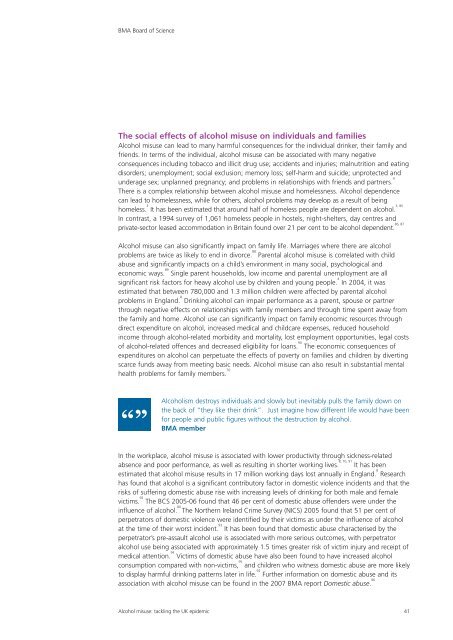Alcohol misuse: tackling the UK epidemic - London
Alcohol misuse: tackling the UK epidemic - London
Alcohol misuse: tackling the UK epidemic - London
You also want an ePaper? Increase the reach of your titles
YUMPU automatically turns print PDFs into web optimized ePapers that Google loves.
BMA Board of Science<br />
The social effects of alcohol <strong>misuse</strong> on individuals and families<br />
<strong>Alcohol</strong> <strong>misuse</strong> can lead to many harmful consequences for <strong>the</strong> individual drinker, <strong>the</strong>ir family and<br />
friends. In terms of <strong>the</strong> individual, alcohol <strong>misuse</strong> can be associated with many negative<br />
consequences including tobacco and illicit drug use; accidents and injuries; malnutrition and eating<br />
disorders; unemployment; social exclusion; memory loss; self-harm and suicide; unprotected and<br />
underage sex; unplanned pregnancy; and problems in relationships with friends and partners. 4<br />
There is a complex relationship between alcohol <strong>misuse</strong> and homelessness. <strong>Alcohol</strong> dependence<br />
can lead to homelessness, while for o<strong>the</strong>rs, alcohol problems may develop as a result of being<br />
homeless. 3<br />
3, 85<br />
It has been estimated that around half of homeless people are dependent on alcohol.<br />
In contrast, a 1994 survey of 1,061 homeless people in hostels, night-shelters, day centres and<br />
86, 87<br />
private-sector leased accommodation in Britain found over 21 per cent to be alcohol dependent.<br />
<strong>Alcohol</strong> <strong>misuse</strong> can also significantly impact on family life. Marriages where <strong>the</strong>re are alcohol<br />
problems are twice as likely to end in divorce. 88<br />
Parental alcohol <strong>misuse</strong> is correlated with child<br />
abuse and significantly impacts on a child’s environment in many social, psychological and<br />
economic ways. 89<br />
Single parent households, low income and parental unemployment are all<br />
significant risk factors for heavy alcohol use by children and young people. 4<br />
In 2004, it was<br />
estimated that between 780,000 and 1.3 million children were affected by parental alcohol<br />
problems in England. 8<br />
Drinking alcohol can impair performance as a parent, spouse or partner<br />
through negative effects on relationships with family members and through time spent away from<br />
<strong>the</strong> family and home. <strong>Alcohol</strong> use can significantly impact on family economic resources through<br />
direct expenditure on alcohol, increased medical and childcare expenses, reduced household<br />
income through alcohol-related morbidity and mortality, lost employment opportunities, legal costs<br />
of alcohol-related offences and decreased eligibility for loans. 90<br />
The economic consequences of<br />
expenditures on alcohol can perpetuate <strong>the</strong> effects of poverty on families and children by diverting<br />
scarce funds away from meeting basic needs. <strong>Alcohol</strong> <strong>misuse</strong> can also result in substantial mental<br />
health problems for family members. 70<br />
“”<br />
<strong>Alcohol</strong>ism destroys individuals and slowly but inevitably pulls <strong>the</strong> family down on<br />
<strong>the</strong> back of “<strong>the</strong>y like <strong>the</strong>ir drink”. Just imagine how different life would have been<br />
for people and public figures without <strong>the</strong> destruction by alcohol.<br />
BMA member<br />
In <strong>the</strong> workplace, alcohol <strong>misuse</strong> is associated with lower productivity through sickness-related<br />
8, 70, 91<br />
absence and poor performance, as well as resulting in shorter working lives. It has been<br />
estimated that alcohol <strong>misuse</strong> results in 17 million working days lost annually in England. 8<br />
Research<br />
has found that alcohol is a significant contributory factor in domestic violence incidents and that <strong>the</strong><br />
risks of suffering domestic abuse rise with increasing levels of drinking for both male and female<br />
victims. 92<br />
The BCS 2005-06 found that 46 per cent of domestic abuse offenders were under <strong>the</strong><br />
influence of alcohol. 80<br />
The Nor<strong>the</strong>rn Ireland Crime Survey (NICS) 2005 found that 51 per cent of<br />
perpetrators of domestic violence were identified by <strong>the</strong>ir victims as under <strong>the</strong> influence of alcohol<br />
at <strong>the</strong> time of <strong>the</strong>ir worst incident. 93<br />
It has been found that domestic abuse characterised by <strong>the</strong><br />
perpetrator’s pre-assault alcohol use is associated with more serious outcomes, with perpetrator<br />
alcohol use being associated with approximately 1.5 times greater risk of victim injury and receipt of<br />
medical attention. 94<br />
Victims of domestic abuse have also been found to have increased alcohol<br />
consumption compared with non-victims, 95<br />
and children who witness domestic abuse are more likely<br />
to display harmful drinking patterns later in life. 92<br />
Fur<strong>the</strong>r information on domestic abuse and its<br />
association with alcohol <strong>misuse</strong> can be found in <strong>the</strong> 2007 BMA report Domestic abuse. 96<br />
<strong>Alcohol</strong> <strong>misuse</strong>: <strong>tackling</strong> <strong>the</strong> <strong>UK</strong> <strong>epidemic</strong> 41
















